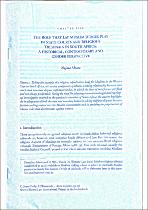| dc.contributor.author | Moosa, Najma | |
| dc.date.accessioned | 2022-10-03T09:38:47Z | |
| dc.date.available | 2022-10-03T09:38:47Z | |
| dc.date.issued | 2002 | |
| dc.identifier.citation | Moosa, N. (2002) "The role that lay Muslim judges play in state courts and religious tribunals in South Africa: A historical, contemporary and gender perspective." Jones-Pauly, C and Elbern, S. (eds) Access to Justice: Role of Court Administrators and Lay Adjudicators in the African and Islamic Contexts, Netherlands: Kluwer, 99-136. | en_US |
| dc.identifier.uri | https://doi.org/10.1163/9789004503052_008 | |
| dc.identifier.uri | http://hdl.handle.net/10566/7994 | |
| dc.description.abstract | Taking the example of a religious adjudicative body for Muslims in the Western Cape in South Africa, this article analyses the symbiotic working relationship between state courts and non-state dispute settlement bodies, in which the lines of interference are fluid and not always predictable. Seeing the need for adapting international legal anthropological investigative methods to the particular situation of South Africa, the author highlights the inadequacies of both the state and non-state bodies in solving religious disputes between factions seeking control over the Muslim communities and in avoiding the perpetuation of Islamic rules that discriminate against women. | en_US |
| dc.language.iso | en | en_US |
| dc.publisher | Kluwer | en_US |
| dc.subject | Muslim Personal Law | en_US |
| dc.subject | Islamic Law | en_US |
| dc.subject | Muslim Judges | en_US |
| dc.subject | Religious Tribunal | en_US |
| dc.subject | Gender equality | en_US |
| dc.title | The role that lay Muslim judges play in state courts and religious tribunals in South Africa: A historical, contemporary and gender perspective | en_US |
| dc.type | Book chapter | en_US |

